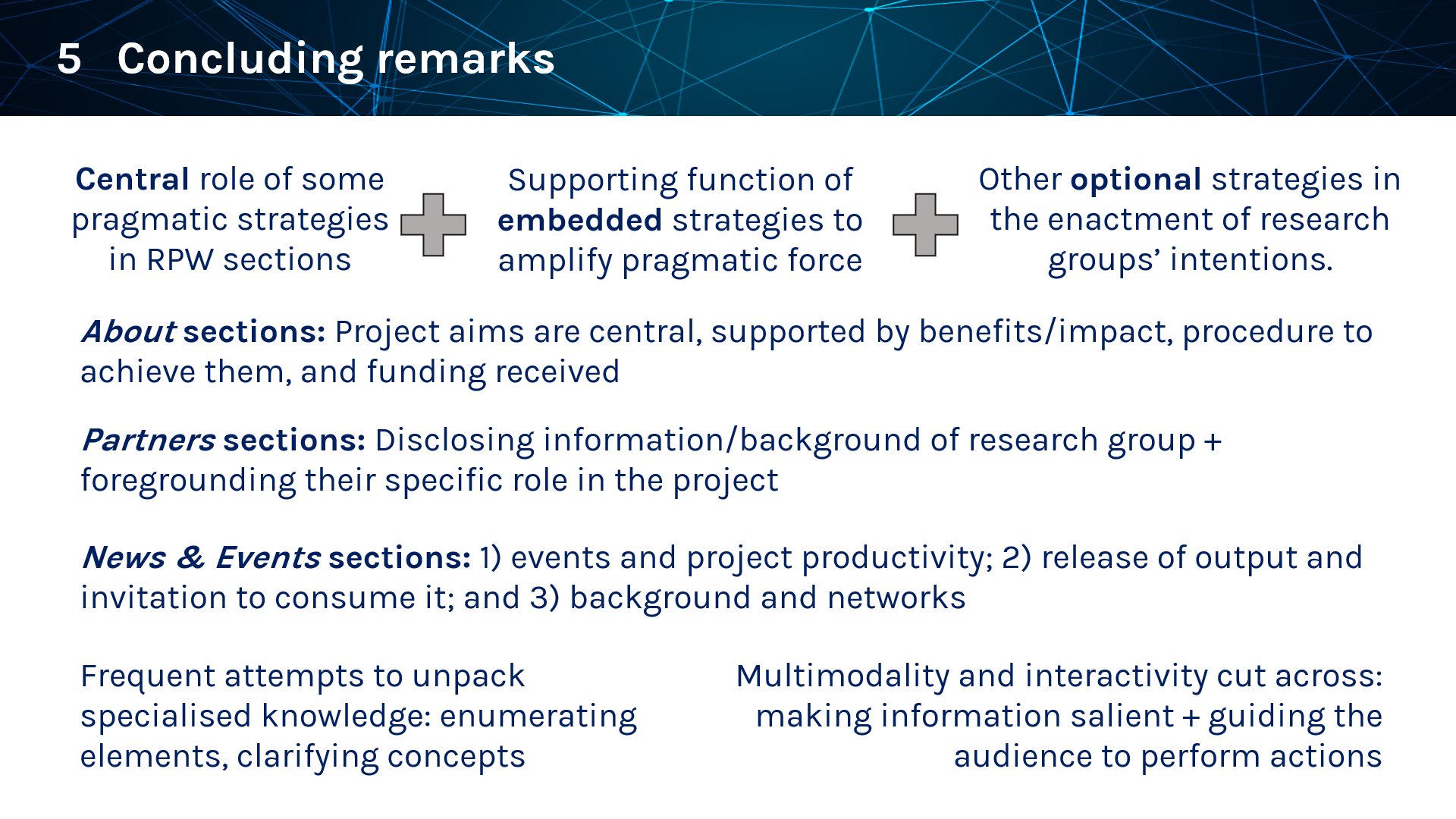AELFE 2025: DANIEL PASCUAL SHEDS LIGHT ON HOW PRAGMATIC STRATEGIES ARE ARTICULATED IN RESEARCH PROJECT WEBSITES

Our team member Dr Daniel Pascual was a participant in the 23rd edition of the AELFE Conference, hosted by Universitat Jaume I. This year 2025 the conference took place in late June, between Wednesday 25th and Friday 27th, and was organised by the GRAPE research group.
The paper that he delivered was entitled “From pragmatic strategies to rhetorical patterns: How research groups manifest intention in their projects”. There, he shared the findings from his pragmatic analysis of the sections comprising Horizon2020 project websites managed by research groups, and discussed the rhetorical patterns that emerged.
You can read his abstract below:
From pragmatic strategies to rhetorical patterns: How research groups manifest intention in their project websites
Endorsing fast-evolving digital discursive practices and effectively conveying communicative intentions may be challenging for scientists and researchers. In the context of international projects, research groups develop digital practices to disseminate project features, updates, and findings, while simultaneously managing self-representation, accountability, and credibility. Websites, as repositories of knowledge and output (Lorés, 2020), are convenient spaces for fulfilling these aims. Their analysis can provide valuable insights, enabling research groups to make informed rhetorical and pragmatic choices to address diverse audiences and communicate their intentions effectively. This study examines these communicative intentions through the lens of “pragmatic strategies” (Pascual, 2023), combined with insights from Bhatia’s (1993, 2002) work on rhetorical structure, by examining the EUROPRO Digital Corpus, which compiles digital practices used by research groups to communicate their Horizon2020 projects (Pascual et al., 2020). The analysis of the frequency and use of pragmatic strategies in the three most prominent sections (About, Partners, and News & Events) of 30 research project websites (RPWs) led to the identification of consistent rhetorical patterns. Thus, this study uncovers how, in a non-linear and flexible manner, the rhetorical structure of research project websites (RPWs) maps patterns of pragmatic strategies that articulate research groups’ discursive intentions. About sections include “Informing about the aim of the research”, and “Acknowledging research funding”; Partners sections consist of “Disclosing information about researchers” and “Highlighting members’ contributions to the project”, among others; and News & Events sections comprise “Giving details about events”, “Spreading a piece of output”, “Stating general background about the project” and “Fostering networks”. These findings are organised into templates for RPW sections that display rhetorical patterns and flexibility through pragmatic strategies. The proposed pedagogical applications can help research groups and scientists draw on discursive evidence to rhetorically accomplish their communicative intentions in an efficient manner regarding their project-related digital practices.
References
Bhatia, V. K. (1993). Analysing genre: Language use in professional settings. Routledge. https://doi.org/10.4324/9781315844992
Bhatia, V. K. (2002). Applied genre analysis: A multi-perspective model. Ibérica 4, 3-19.
Lorés, R. (2020). Science on the web: The exploration of European research websites of energy-related projects as digital genres for the promotion of values. Discourse, Context & Media, 35, 1-10. https://doi.org/10.1016/j.dcm.2020.100389
Pascual, D. (2023). Scientific dissemination and professional practices through digital media: The study of pragmatic strategies in the communication of international research projects. Unpublished doctoral dissertation. Universidad de Zaragoza. https://zaguan.unizar.es/record/126892/files/TESIS-2023-125.pdf
Pascual, D., Mur-Dueñas, P. and Lorés, R. (2020). Looking into international research groups’ digital discursive practices: Criteria and methodological steps taken towards the compilation of the EUROPRO digital corpus. Research in Corpus Linguistics, 8(2), 87-102. https://doi.org/10.32714/ricl.08.02.05
